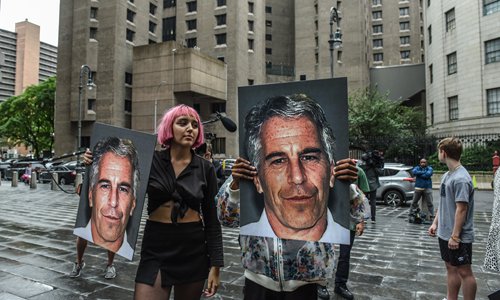HOME >> OPINION
There lies truth, in one’s perception
By Rong Xiaoqing Source:Global Times Published: 2019/8/22 17:33:40

A protest group called "Hot Mess" hold up signs of Jeffrey Epstein in front of the Metropolitan Correction Center on July 8, 2019 in New York City. Photo: AFP
When Jeffrey Epstein was found dead in his jail cell in Lower Manhattan on August 10, speculation surged like wildfire. The initial reports of a suicide seemed to be at odds with many people's perceptions of the disgraced financier who had been awaiting trial after being charged with sex trafficking of minors.
He had money and knew many powerful people, such as President Donald Trump, former president Bill Clinton and Britain's Prince Andrew. When he was charged for the first time a few years ago after a teenager's mother complained that he molested her daughter, and three dozen women were identified by investigators as his victims, he was able to get away with nothing more than a slap on the wrist. The sentence was 13 months in prison with work release that allowed him to leave custody for 12 hours per day six days a week.
Given that he almost certainly knew the secrets of many powerful people and could have been prompted to tell those stories to prosecutors during the trial process, a suicide sounded a twist too convenient to be true.
President Trump may have stoked the fire by retweeting comedian Terrence Williams' post insinuating the Clintons' involvement in Epstein's controversial death. But ordinary people have their share of doubts. At a rooftop party, my neighbors came up with all kinds of stranger-than-fiction plots. They included various ways in which he may have been murdered and even they thought that he might have faked his own death.
Even the media outlets, which in general, often concoct conspiracy theories, blinked for a second. A Washington Post story focused on some broken bones in his neck that were more likely to have been caused by strangling than hanging. And The New York Times columnist Ross Douthat reminded readers of conspiracy theories "pointing toward something worth investigating."
After an autopsy, the New York City medical examiner concluded on August 16 that it was a suicide. But I don't know how much difference it makes. After all, people who don't believe it was a suicide are those who don't like to trust authorities in the first place.
The situation sounds familiar. There are still people in the US who believe Neil Armstrong never took that "small step" on the moon, they believe Kennedy's assassination and the 9/11 attacks were inside jobs, and the government and doctors have been working together to "infect" American children with autism by administering vaccines. The US is never short of conspiracists.
What's scary though is that the confusion between truth and falsehood is destined to worsen in the future. The information explosion on the internet has challenged the authority of traditional media and weakened the role traditional journalistic principles espousing checks and balances serve. The barrage of information and misinformation means that anyone who is able to manage a mouse can easily find plenty of ammunition to defend any opinion they may have.
The old school way of finding the truth - to learn as much as one possibly could - still works. But it may no longer be practical. For one, no matter how much information you manage to glean about something, you would always find that what you get is only a small part of an ever-growing heap - the risk of bias is only increasing.
And people, more polarized than ever, are less likely to be willing to seek the truth via this onerous method. They only want to know what they'd like to know. Take the Russiagate scandal, a two-year investigation, 400 page-report and seven-hour-testimony of the special counsel later, most people still stand by what they believed.
This is not an encouraging sign, and I only have a desperate solution. I anticipate that artificial intelligence (AI), which has the ability to alter reality, will get more popular. Last year, a video made by comedian Jordan Peele using AI tools went viral. It showed former US president Barack Obama apparently saying whatever Peele put into his mouth.
Anything we see may not be true or may not at least be the whole truth, given the limiting nature of our own perspectives. It is so now. But I have a slim hope that when more people see how easily the reality can be manipulated, more people will realize that our own beliefs could be as wrong or incomplete as those of our enemies.
Only then, maybe we'll finally step out of our own silos to look at and listen to other people. And that is the only path to be able to inch closer to the truth.
The author is a New York-based journalist and Alicia Patterson fellow. rong_xiaoqing@hotmail.com
RELATED ARTICLES:
Posted in: COLUMNISTS,VIEWPOINT